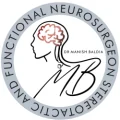Parkinson’s disease is a progressive neurodegenerative disorder that primarily affects movement. Find the best Parkinson treatment in South Mumbai
Symptoms of Parkinson’s Disease
Parkinson’s disease symptoms can be categorized into motor and non-motor symptoms. Understanding these symptoms is crucial for early diagnosis and effective management.
Motor Symptoms:
- Tremor: One of the most recognizable symptoms is a tremor, often starting in the hand or fingers. This resting tremor usually occurs when the muscles are relaxed and may decrease with purposeful movement.
- Bradykinesia: This refers to the slowness of movement, making everyday tasks difficult and time-consuming. Patients may notice a reduction in spontaneous movements and overall activity.
- Rigidity: Stiffness in the limbs and trunk is another hallmark of PD. This rigidity can cause discomfort and limit the range of motion.
- Postural Instability: Balance issues and a tendency to fall are common as the disease progresses. This instability is often due to a loss of reflexes needed to maintain an upright posture. Find Here Best Parkinson treatment in South Mumbai.
Non-Motor Symptoms:
- Cognitive Impairment: Many individuals with Parkinson’s experience cognitive changes, including problems with memory, planning, and problem-solving.
- Mood Disorders: Depression and anxiety are frequent companions of PD, significantly impacting the quality of life.
- Sleep Disturbances: Insomnia, restless legs syndrome, and REM sleep behavior disorder can disrupt the sleep patterns of those with Parkinson’s.
- Autonomic Dysfunction: This includes a variety of symptoms such as constipation, urinary issues, and blood pressure fluctuations. Find Here Best Parkinson treatment in South Mumbai.
Treatment Options for Parkinson’s Disease
While there is no cure for Parkinson’s disease, various treatments can alleviate symptoms and improve quality of life. These treatments include medications, surgical options, and lifestyle changes.
Medications:
- Levodopa: The most effective treatment for PD, levodopa is converted to dopamine in the brain, helping to manage motor symptoms. It is often combined with carbidopa to prevent nausea and increase its efficacy.
- Dopamine Agonists: These medications, such as pramipexole and ropinirole, mimic the effects of dopamine in the brain. They are usually prescribed in the early stages or alongside levodopa in advanced stages.
- MAO-B Inhibitors: Monoamine oxidase B inhibitors like selegiline and rasagiline prevent the breakdown of brain dopamine, thereby enhancing its availability.
- COMT Inhibitors: Catechol-O-methyltransferase inhibitors, including entacapone and tolcapone, extend the effect of levodopa by inhibiting its breakdown.
- Anticholinergics: These are used to control tremors and muscle rigidity. However, their use is limited due to side effects such as memory problems and confusion.
- Amantadine: Originally an antiviral medication, amantadine can help with mild symptoms and may reduce dyskinesia (involuntary movements) caused by long-term use of levodopa. Find Here Best Parkinson treatment in South Mumbai.
Surgical Treatments:
- Deep Brain Stimulation (DBS): DBS involves implanting electrodes into specific brain areas to regulate abnormal impulses. It can significantly reduce motor symptoms and the need for medications.
- Lesioning Surgery: Procedures such as thalamotomy and pallidotomy involve creating lesions in parts of the brain that cause tremors and other motor symptoms. These are less common today due to the success of DBS.
Lifestyle and Supportive Therapies:
- Physical Therapy: Regular physical activity can improve mobility, balance, and overall well-being. Physical therapists can tailor exercises to address specific issues.
- Occupational Therapy: Occupational therapists help patients maintain their independence by improving their ability to perform daily tasks.
- Speech Therapy: Speech and language therapists can assist with speech difficulties and swallowing problems common in PD.
- Diet and Nutrition: A balanced diet can support overall health and potentially ease some non-motor symptoms. High-fiber foods can help manage constipation, while staying hydrated is crucial.
- Mental Health Support: Counseling, cognitive behavioral therapy, and support groups can help manage depression, anxiety, and cognitive changes. Best Parkinson treatment in South Mumbai
Emerging Treatments:
Research is ongoing into new treatments for Parkinson’s disease. These include:
- Gene Therapy: Experimental treatments aim to correct genetic mutations linked to PD or introduce genes that protect neurons from degeneration.
- Stem Cell Therapy: Researchers are exploring the potential of stem cells to replace damaged neurons and restore dopamine production.
- Neuroprotective Agents: These aim to protect nerve cells from further damage, potentially slowing disease progression.
Conclusion
Parkinson’s disease poses significant challenges, but with the right treatment approach, individuals can manage their symptoms and maintain a good quality of life. Medications, surgical options, and supportive therapies each play a crucial role in a comprehensive treatment plan. Find Here Best Parkinson treatment in South Mumbai






